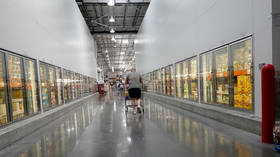Outcome of Russian energy embargo for Germans predicted

Consumer prices in Germany will see a 7-8% increase in 2022, Karl von Rohr, the vice president of Deutsche Bank, told the Frankfurter Allgemeine newspaper. However, if the government restricts Russian energy imports, prices could spike 10% or more in the coming months.
“If energy imports are more limited, we may even see 10% or more. We must brace ourselves for inflation rates not seen since the 1970s,” von Rohr stated.
Last month, the annual inflation rate in Germany reached a record high of 7.3%. Prices have been soaring after the EU and a number of other countries placed economic sanctions on Russia in response to Moscow’s military operation in Ukraine. Sanctions jeopardized the prospect of uninterrupted energy flows from Russia to the EU, even though Russian energy carriers have so far been largely untouched by restrictions.
European leaders have vowed to step up efforts to lower the bloc’s dependence on Russian oil and gas, and Germany managed to lower the percentage of Russian oil imports from 35 to 25% over the past month and a half. Gas imports have also been cut to 40% from the previous 55%, while Russian hard coal imports have been halved, to 25%. Still, Berlin says it could take until the summer of 2024 to end its reliance on Russian energy completely.
According to a poll conducted for the Frankfurter Allgemeine earlier this week, over one half of Germans are opposed to banning Russian oil and gas imports.
For more stories on economy & finance visit RT's business section













